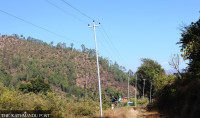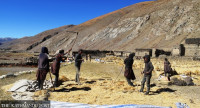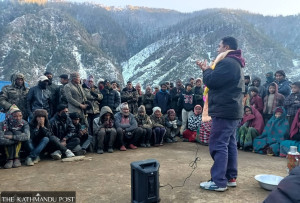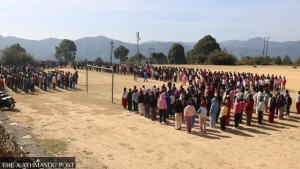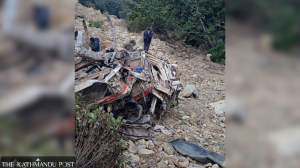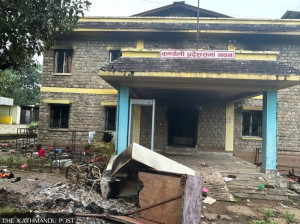Karnali Province
Health facilities in Karnali Province fail to attract doctors
Out of 704 posts of health workers in the province, 441 are vacant.
Jyotee Katuwal
The Primary Health Centre of Thantikadh has been without a doctor for the last 13 months. On August 29, 2020, a pregnant woman from Siragi in Thantikadh Rural Municipality Ward No. 1 died for want of treatment. Twenty-three-year-old Parbati Shahi was taken to the Primary Health Centre but there were no doctors there, her family said.
“She needed medical assistance but there were no doctors at the health centre,” said Tej Bahadur Shahi, a relative of Parbati.
Government health facilities in Karnali Province are facing an acute shortage of doctors and health workers.
Four months ago, Mahabu Rural Municipality in Dailekh had announced vacancies for the posts of three health workers to operate a 10-bed hospital. The local unit has not received a single application and therefore the hospital is yet to come into operation.
Dolpa Hospital has not had a medical specialist in the last two decades since senior doctors do not apply for vacant positions in such remote locations, says Dr Sijan Rawal, the acting chief of the hospital. “The hospital is being run by eighth-level doctors.”
The District Hospital in Salyan is also being operated by the acting chief for the last seven months. Dr Dasarath Kumar Shrestha was deployed as the acting chief after the hospital chief Dr Arjun Kumar Budha took a two-year study leave.
In Dailekh District Hospital, only one out of 14 posts of doctors has been filled so far.
“There's a shortage of health workers in remote areas, as the federal government has delayed filling up vacant posts in the last three years,” Shrestha said.
There are 28 health posts, one primary health centre and a district hospital in Kalikot. But the entire district has only one permanent doctor.
According to health workers, rural hospitals are unable to provide extensive medical services to the local population because of the dearth of senior medical professionals.
“Hospitals in remote locations can’t even provide basic medical services or treatment for minor ailments,” said Dr Bhisma Prasad Pokharel, chief at the District Health Office in Kalikot. “The district hospital has only one doctor which makes it difficult to cater to all patients.”
There are 12 hospitals, 13 primary health centres and 336 health posts in Karnali Province. Out of 704 posts of health workers in the province, 441 are still vacant, according to the data of the Karnali Health Service Directorate.
According to the government standards, there should be ninth-and tenth-level medical specialists in each district hospital. But there are only eighth-level doctors in the majority of district hospitals in Karnali at present.
From mid-March, nine district hospitals of the province are going to be without permanent doctors following their transfer and study leave.
“Doctors from Kalikot, Jajarkot, Salyan, Mugu, Rukum (West), Humla, Mugu, Surkhet and Dailekh are being transferred to other districts or are going to take a study leave from mid-March,” said Dr Rabin Khadka, director of the Karnali Health Service Directorate.
“The provincial government has to rely on health workers appointed on a contract basis due to the shortage of permanent health workers,” said Loknath Paudel, secretary at the Ministry of Social Development in the province. “Health workers appointed on a contract basis are not as committed to the post as we would like them to be.”
According to the ministry, hardly five percent of the posts of 11th-level doctors and 20 percent of 10th-level doctors have been filled in Karnali Province.
“We offer an attractive package to health workers deployed in Karnali but that has failed to attract applications. Patients from Karnali are still forced to go to other provinces to receive treatment due to health workers shortage,” said Khadka from Karnali Health Service Directorate.
In January 2020, the provincial Cabinet had decided to provide encouragement allowances to government employees in the province.
According to the decision, eleventh-level specialist doctors are to receive 75 percent to 135 percent of their basic salary as allowance for working in Karnali.
Similarly, specialist doctors of ninth-and-tenth levels are to receive allowances equivalent to 75 to 125 percent of their basic salary. For other health workers, the figure stands at 50 to 100 percent allowance based on the geographical remoteness of the districts they are deployed in.
“Most of the doctors are attracted towards a career in the cities,” said Khadka. “We are trying to invite as many applications as possible but so far we are failing miserably.”




 18.12°C Kathmandu
18.12°C Kathmandu




